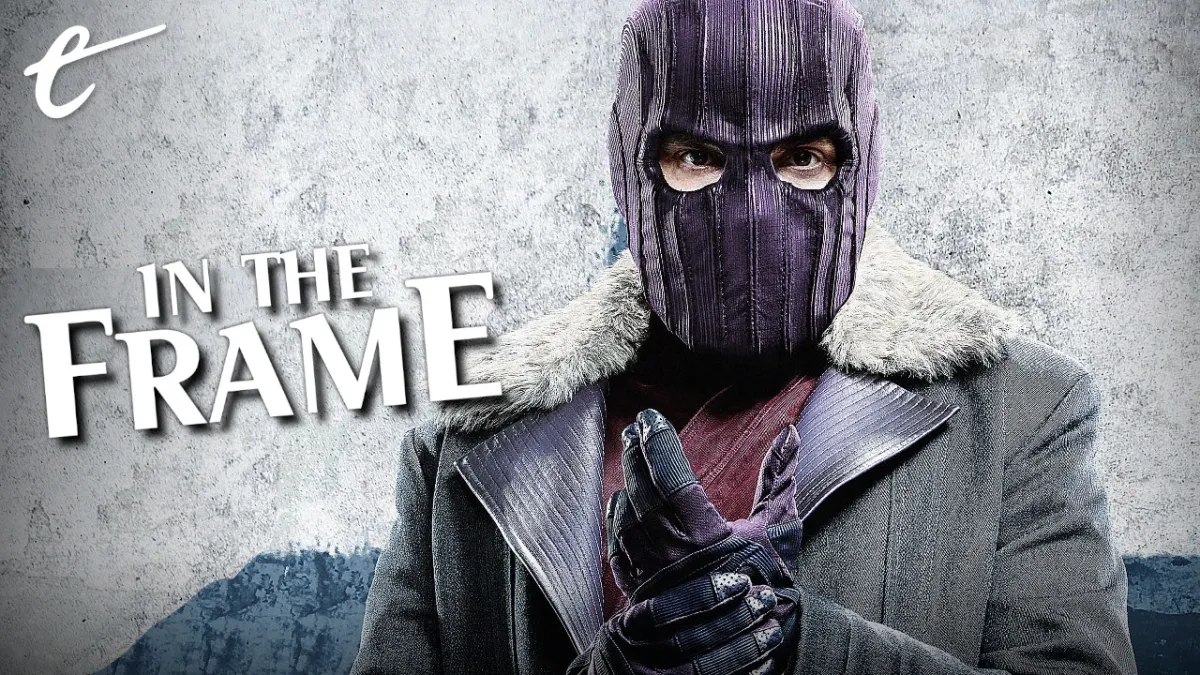On paper, Helmut Zemo (Daniel Brühl) was a fascinating villain for Captain America: Civil War.
Zemo was a citizen of Sokovia, the country ravaged by Ultron (James Spader) in Avengers: Age of Ultron. The country’s capital city was destroyed by Ultron, who lifted it into the upper atmosphere in an attempt to recreate the asteroid that killed the dinosaurs. In The Falcon and the Winter Soldier, it is revealed that the country of Sokovia no longer exists, “cannibalized by its neighbors before the land was cleared of rubble, erased from the map.” Zemo lost his wife and son in the attack.
Ultron was defeated, killed by Vision (Paul Bettany) at the end of Age of Ultron. However, Ultron was an artificial intelligence designed by Tony Stark (Robert Downey Jr.) and Bruce Banner (Mark Ruffalo) as an extension of Stark’s “Iron Legion” plan, an effort to build “a suit of armor around the world.” Stark never faced any consequences. In fact, the Marvel Cinematic Universe is largely contemptuous of any effort to make superheroes face consequences.
Iron Man 2 finds Stark actively antagonistic of any effort by elected officials to check his efforts to privatize world peace. In Age of Ultron, Wanda Maximoff (Elizabeth Olsen) unleashes the Hulk against the civilian population of Johannesburg and is offered a place on the Avengers for her trouble. In Civil War, efforts to impose restraint on the superheroes’ unilateral foreign intervention following significant civilian casualties are treated as inherently unreasonable.
This is the hook for Zemo’s character in Civil War. He is not wrong. His family died because Tony Stark decided that he knew better than anybody else and built an omnicidal killer robot that destroyed a country. On paper, Zemo is the best sort of villain. Zemo recalls the best characterizations of Magneto (Ian McKellen and Michael Fassbender) in the X-Men movies — an extremist doing the wrong things for the right reason.

In Civil War, Zemo should have solved Marvel Studios’ “villain problem.” There is a longstanding criticism that the company’s antagonists, with notable exceptions like Loki (Tom Hiddleston) or Killmonger (Michael B. Jordan), lack any real complexity or nuance. Theoretically, Zemo’s motivations are more logical and tangible than the weird nonsensical Malthusian logic that motivates Thanos (Josh Brolin). More than that, Daniel Brühl is a phenomenal talent.
Of course, Zemo doesn’t really work in Civil War, for reasons that have nothing to do with the character. To put it simply, neither the film nor the universe is built to support the version of Zemo suggested in the movie: the scheming villain with sympathetic motivations and monstrous methods. Most obviously, Civil War isn’t actually that interested in Zemo. It is much more interested in the fact that Robert Downey Jr. signed on to reprise the role of Tony Stark, so the film is built around that.
More to the point, the MCU is not designed to withstand the implied criticism offered by Zemo. Zemo is entirely right to criticize the Avengers as übermenschen who consider themselves above the petty affairs of mortals. In The Falcon and the Winter Soldier, Zemo quite pointedly asks whether Bucky (Sebastian Stan) or Sam Wilson (Anthony Mackie) ever visited the memorial to those lost in Sokovia. “Of course not,” he answers his own question. “Why would you?”
If Civil War acknowledges that Zemo is correct, the MCU stops being lighthearted escapism and becomes more unsettling and uncomfortable. It becomes a metaphor for those lives lost in unilateral foreign interventions by real-world superpowers. It invites the audience to think about how so much of the modern superhero genre fetishizes use of power with little thought to its application. It confronts the audience with how much of the franchise is tied to the American military-industrial complex. To put it more simply, it runs the risk that it might stop being fun.

In the abstract, Zemo wins at the end of Civil War. He manipulates Steve Rogers (Chris Evans) into almost killing Tony Stark, one of his best friends. He fractures the superhero community, turning half of them into fugitives on the run from the law. He fans flames that lead to superhero carnage in Berlin. Theoretically, following the events of the film, the public should be more terrified of superheroes in general — and Captain America in particular — than ever before.
However, the MCU cannot acknowledge Zemo’s moral victory. Civil War ends with Rogers giving Stark a phone that he can use in case of emergency, suggesting no lasting acrimony. The divided superheroes reconcile incredibly quickly in Avengers: Infinity War, with barely any acknowledgement of that time they almost killed each other. Stark and Rogers share a single tense scene in Avengers: Endgame, but there’s no sense of any bad blood between them in the long term.
It’s worth contrasting this, for example, with the Joker’s (Heath Ledger) moral victory over Batman (Christian Bale) in The Dark Knight. By the end of The Dark Knight, the Joker has corrupted and disgraced Harvey Dent (Aaron Eckhart), forcing Batman to lie to preserve Dent’s reputation. This moral compromise forms the entire basis of The Dark Knight Rises, with Gotham collapsing into anarchy when that betrayal is eventually revealed to the city.
The characters in The Falcon and the Winter Soldier, including Zemo himself, talk about Steve Rogers as a saintly figure. They don’t discuss how Rogers almost murdered Stark because he didn’t want Bucky to be held to account, they don’t discuss his disregard for the rule of law, and they don’t discuss the chaos in Berlin. He’s a hero. There’s no complicated legacy.

This is why the soft reboot of Zemo works in The Falcon and the Winter Soldier. Much of The Falcon and the Winter Soldier plays like a reworking of the Captain America movies, particularly The Winter Soldier and Civil War. However, the series shifts gears away from the ’70s paranoid thrillers that were reportedly touchstones for The Winter Soldier and Civil War and into ’80s buddy comedy action films. It’s an approach that works wonders because it’s a register that plays to the MCU’s strengths.
The Falcon and the Winter Soldier retools Zemo from a philosophical antagonist to a quirky supporting character, like the role that Leo Getz (Joe Pesci) plays in the later Lethal Weapon films. Part of this involves turning Zemo into comic relief, to the point that Marvel has released an hour-long video of Zemo dancing. Zemo is a better fit for comedy than the series’s two leads, and Brühl is a gifted performer when it comes to arch line-readings and reaction shots.
This repositioning of Zemo allows The Falcon and the Winter Soldier to do more interesting things with the character than Civil War. Most obviously, there’s something very clever in the way that the show seems to play Zemo as the MCU’s answer to Batman. Zemo is revealed to be rich, and a lot of his first episode is spent on the same sort of private jet sets that defined so much of Christian Bale and Ben Affleck’s takes on the Caped Crusader. He even has an older man servant.
The Falcon and the Winter Soldier reveals Zemo to be a baron, in an obvious homage to the comic book character. However, it also sets up a nice thematic opposition to the American superheroes. Zemo is framed as a very “old world” idea of power, the aristocratic class associated with Europe. In contrast, the MCU (and superhero comics) often frames American superheroes as a “new money” upper social class, with their mansions in Central Park and their skyscrapers in Manhattan. Zemo understands power, albeit of an older sort.

As such, there’s an interesting tension between Zemo and the Avengers, placing both in a revealing context. More than that, because Zemo is not the primary antagonist of (and is framed as the comic relief within) The Falcon and the Winter Soldier, the show is able to afford him more credibility than Civil War did. He can’t be right in Civil War, because — if he is — then he wins and the heroes lose. He can be right in The Falcon and the Winter Soldier because it’s not an either/or conflict. It’s not binary.
This plays to Brühl’s strengths as a performer, even more than discussing the merits of Trouble Man in the style of a supervillain monologue. One of Brühl’s breakout roles in English-language cinema was as Formula 1 driver Niki Lauda in Ron Howard’s Rush, effectively the living embodiment of the idea that “the asshole has a point.” Unsurprisingly, a lot of Brühl’s subsequent work — such as The Alienist — plays into this. Brühl excels at playing characters who are jerks but who are not wrong.
The most surprising aspect of The Falcon and the Winter Soldier is the internal consistency that the show affords Zemo. When Zemo corners Karli Morgenthau (Erin Kellyman) and confiscates the super-soldier serum that she has been using, he doesn’t try to steal or hide any of it. He destroys it, in a moment played as catharsis for the character. His fears about the serum are validated, as both Morgenthau and John Walker (Wyatt Russell) kill civilians while dosed with it. The Falcon and the Winter Soldier acknowledges that maybe Zemo has a point.
There are moments when The Falcon and the Winter Soldier teases the idea of Zemo as a monstrous supervillain Wilson and Bucky will need to stop, thus validating their worldview and invalidating his criticisms: He’s introduced playing chess and reading Machiavelli as if to set up a later reveal that it was “Zemo all along,” and he escapes their clutches in the fourth episode. However, it is revealed that he only escaped to pay his respects to those lost in Sokovia at the memorial and surrenders peacefully.
The result is a compelling reinvention of a character who should have been a slam dunk in Civil War but was never going to work within the structural framework of the larger franchise. The Falcon and the Winter Soldier understands the limits of this framework and so redesigns Zemo accordingly, retaining the most compelling aspects of the character while reworking them to make them less threatening to the Marvel Cinematic Universe. It’s a triumph.





